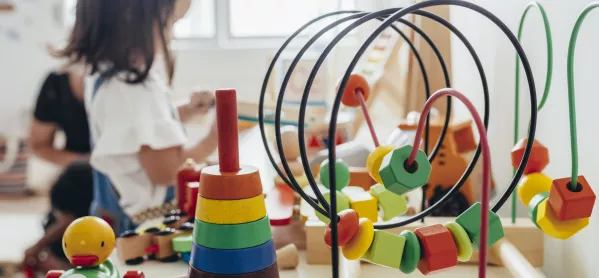- Home
- Analysis
- Early Years
- EYFS Profile: Why the impact of Covid can’t be ignored
EYFS Profile: Why the impact of Covid can’t be ignored

Earlier this month the Department for Education published the 2022 handbook for the Early Years Foundation Stage Profile (EYFSP), which provides the latest guidance on children’s assessments at the end of Reception year.
This year’s handbook update is more significant than others, as it accompanies the introduction of the government’s new EYFS framework and comes with some important differences in terms of content and context.
The EYFS Profile updated guidance for 2022
The content: A strong focus on communication and language skills
The EYFS framework sets the statutory standards for the development, learning and care of children aged 0 to 5 and applies to all Ofsted-registered early education providers in England.
The government’s intention with its new framework is to make early years learning goals clearer and more specific so that - the theory goes - they will be easier to assess and teachers’ workload will be reduced.
As part of this, the new framework has a greater emphasis on children’s communication and language skills and literacy skills.
For communication and language there are now two goals instead of three - listening, attention and understanding; and speaking (with understanding moved from its own goal into listening and attention) - and it includes more focus on adult-child interactions.
Meanwhile, literacy includes a stronger emphasis on pre-Reception literacy learning, and the link between language comprehension and later reading and writing.
It’s up to schools how this is delivered because the framework makes it clear that it’s not a curriculum but overall this focus is welcomed for multiple reasons, most importantly because it is rooted in sound evidence: we know that language and communication skills underpin literacy skills, and both form the foundations for future learning.
However, the new framework was not devised with the possibility of the pandemic in mind - it essentially started being formed in 2017 - which is why we need to put it in the right context so that we understand the work required to deliver on these aims.
The context: The effects of the pandemic
It’s increasingly hard to ignore the mounting evidence on the impact of the pandemic on children’s wellbeing and educational outcomes, particularly in the areas of literacy and numeracy, and for younger children, language and communication.
For example, the Education Endowment Foundation-funded School Starters project found that teachers were concerned about levels of language and communication, literacy and numeracy in children who started school in autumn 2020.
Similarly, the latest report by my colleagues at the Education Policy Institute found similar levels of learning loss, with two months lost for reading and three for maths. These findings are echoed by the Impact of Covid-19 on Key Learning and Education project run by the University of Leeds
It’s crucial to acknowledge that children in Reception classes this year (2021-22) - to whom the new EYFS framework applies - have experienced almost two years of early education attendance disruption.
Even when settings were allowed to reopen, attendance rates remained below pre-pandemic levels, meaning that many children missed out on important experiences and interactions with peers and adults beyond their family members, which are key for their socioemotional and language and communication skills development.
On top of the hit to the learning and development of children, the early years sector itself is facing significant challenges, with issues pre-dating the pandemic exacerbated to the point of settings facing closure or a reduction in quality.
Early years professionals remain poorly paid and lacking professional status.
Access to professional development beyond the mandatory level has always been erratic but it is particularly worrying that 40 per cent of settings responding to a survey in May 2021 reported that training for speech and language is insufficient, just when the closing of the achievement gap is stalling, and many children have missed out on several months of early years provision and/or other social interactions.
In this light, the government commitment of £153 million over three academic years for training as part of the Early Years Professional Development Programme is welcome news. But is it enough?
Don’t lose sight of the forest
Children did not just miss out on lessons. The impact of Covid-19 goes beyond educational outcomes, and for young children may impact on the development of their broader socioemotional skills.
While the stronger focus on language and communication skills and literacy skills provided by the revised EYFS Profile is welcome, we cannot lose sight of the need right now to keep a broad focus on children’s wellbeing and development.
In fact, evidence suggests that socioemotional interventions can have a significant impact on educational outcomes.
Only time will tell if the new EYFS Profile’s promise of improved language skills and lower staff workload will be realised. But we cannot afford a “wait and see” approach for a broader recovery.
Schools have a great role to play to reflect on what it really means to support future generations of school starters, but we can’t let all the responsibility fall on to them.
Likewise, we cannot just wait until Reception year to provide children with the right support.
Sara Bonetti is director of early years at the Education Policy Institute think tank
You need a Tes subscription to read this article
Subscribe now to read this article and get other subscriber-only content:
- Unlimited access to all Tes magazine content
- Exclusive subscriber-only stories
- Award-winning email newsletters
Already a subscriber? Log in
You need a subscription to read this article
Subscribe now to read this article and get other subscriber-only content, including:
- Unlimited access to all Tes magazine content
- Exclusive subscriber-only stories
- Award-winning email newsletters
topics in this article



